
Self-reliance is a very beautiful and practical way of living to strive for, which offers many rewards, mostly beyond the monetary realm. Yet, there are a few intrepid homesteaders out there who want to push their limits even further.
Self-sufficiency isn’t an “all or nothing” act.
Learning to live a self-sufficient life takes time, as well as money and energy.
It’s the accumulation of many hours of hands-on and practical experiences that make one person more adept than the other at living simply and well.
For example, growing a survival garden may work exceedingly well for those living on less land, who also happen to love eating vegetables. But, sometimes, you need to take your growing skills a step further.
That’s where raising your own livestock comes into the picture.
In our homesteading experience that extends to more than a decade, fruits and vegetables aren’t enough on their own to provide energy throughout the entire year. Sure, our pantry is full of canned goods, both from our own land and the market, but where’s the protein? That comes from eggs and meat. It could possibly come from fish, too; that’s a dream for the future.
The point is to start where you are.
If you have a small backyard and want to introduce some homegrown protein into your life, begin with poultry. Chickens, quail and ducks usually fit the bill.
Small animals are easier to handle than larger ones, and the learning curve is less costly. From raising to slaughter, birds are among the easiest animals to raise for self-sufficiency, so we’ll start there.
As your land grows in size, you can introduce goats, pigs and cows, provided you can grow or obtain sufficient feed to keep them happy and healthy.
With time, your livestock skills will grow. Not only will you be able to provide meat and eggs for feeding yourself, but it is also an essential skill that can be monetized in times of need, for others will inevitably want to learn your wise ways.
Even with a little bit of land, you can feel empowered by raising your own animals, thus putting food on the table or in the freezer.
Let’s get started!
1. Chickens
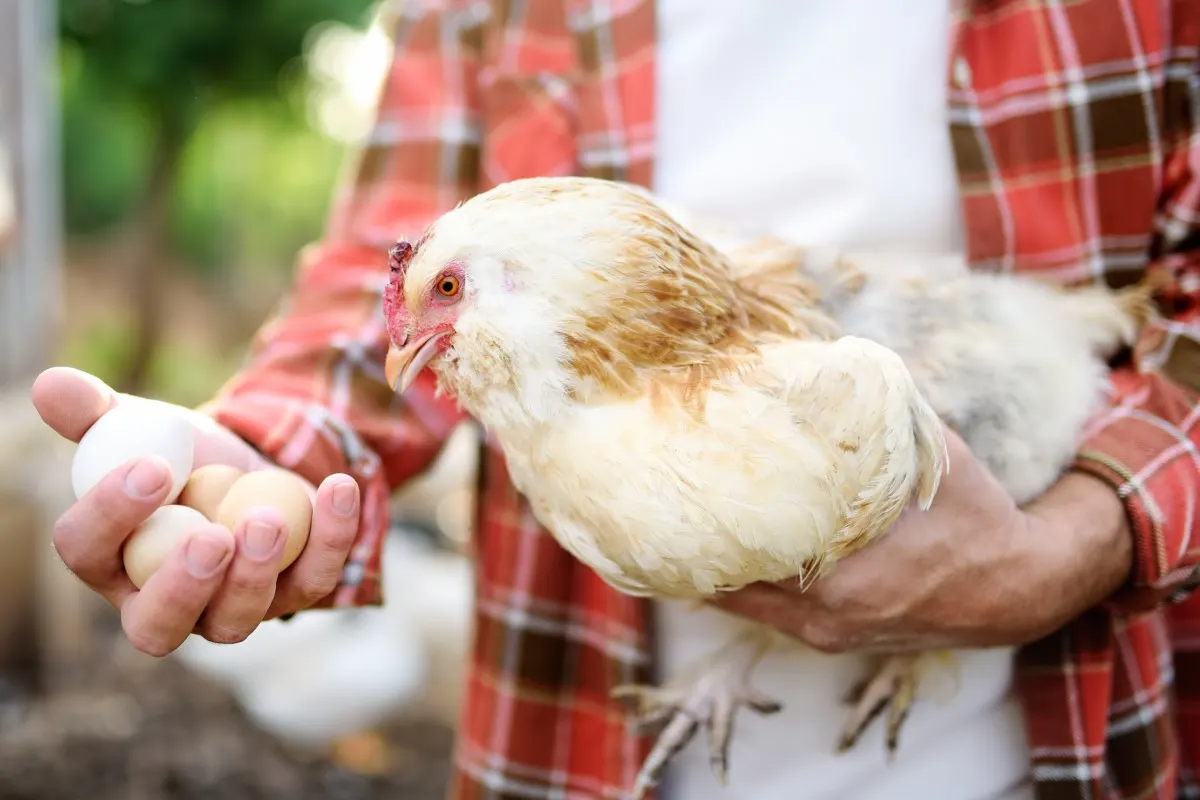
Without a doubt, chickens are where most people start their animal-raising adventures. We’ve done that too for a couple of years, then quietly went back to raising ducks. Which poultry to raise is a matter of preference. It also depends on your yard setup.
Perhaps the greatest thing about chickens is that they can lay a lot of eggs, with some hens laying 300+ eggs per year.
Notice, I said can. In order to do this, you must choose the right breed, give them the best nutrition possible, make sure they are happy, protect them from predators and do your best to nurture a healthy flock.
Advantages of Raising Chickens
- Eggs – an endless supply of eggs is yours for the raising. Don’t forget that eggshells are edible too. Plus, you can sell eggs if you have too many, a win-win situation indeed.
- Meat – think about how much chicken you purchase from the store, then imagine how you could do the same or better at home. Butchering is simple enough, but be sure to raise meat birds for the best flavor.
- Eggs for hatching – self-sufficiency is about providing for your income, too, not just dinner.
- Selling chicks – if you’ve got a great mama chicken, let her do her job, or invest in an incubator if you’d like to reliably sell chicks.
- Pest control – chickens are excellent foragers, more than willing to eat ticks and all sorts of bugs in the garden.
- Manure/fertilizer – chicken poop is worth something, too, especially once it’s turned into compost.
- Feathers – can be used for crafts, stuffing, insulation and more. A by-product of all fine-feathered creatures.
Chickens, in general, are easy to care for, eat weeds and garden scraps and take very little of your time (unless they are able to get out of their fenced-in area). They are excited in a chicken tractor just as much as they are out free-ranging, always on the move in search of bugs and earthworms. In exchange for their service, they must be protected at night.
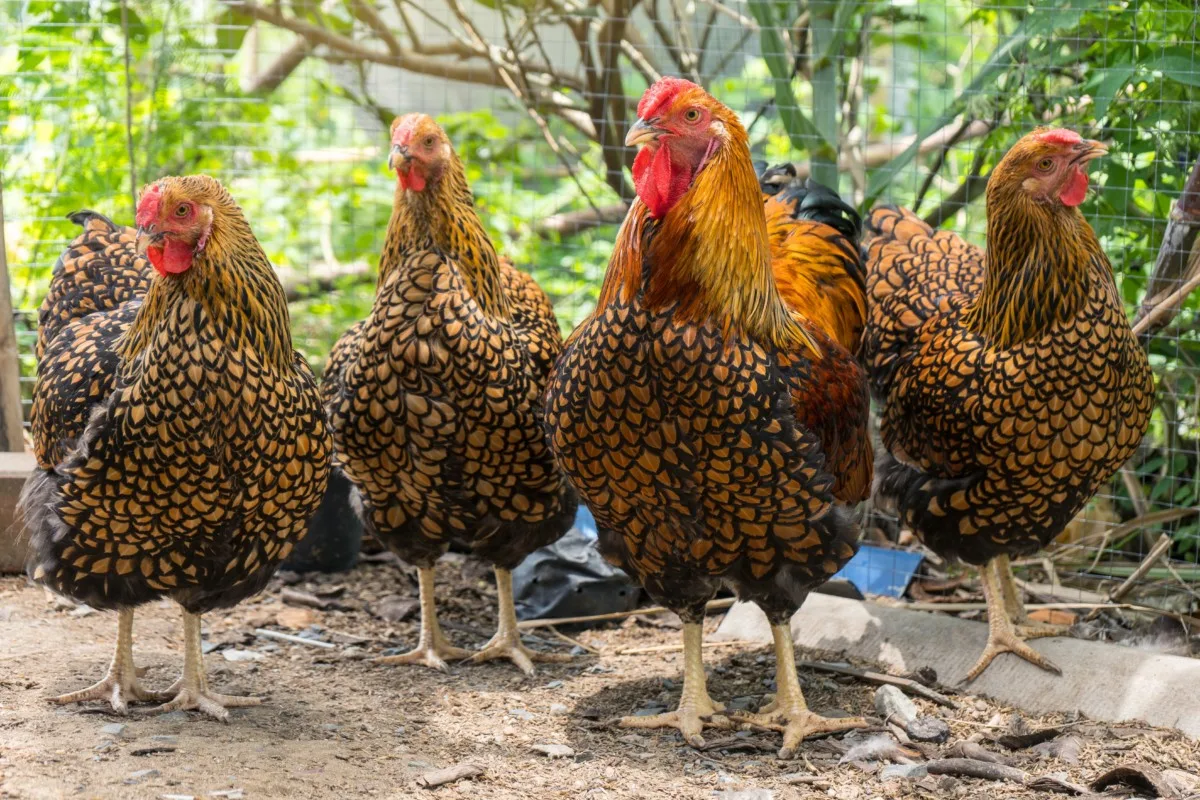
Disadvantages of Raising Chickens
- Noise – without a doubt, chickens are noisy, early in the morning and throughout the day. If your neighbors don’t already have a flock, they may be concerned; talk to them before investing in some birds of your own.
- Diseases – originating in Indonesia, yet naturalized around the world, chickens are susceptible to many poultry-specific health issues. Depending on the breed, they can also be quite sensitive to extreme temperatures, both hot and cold.
- Prey animals – with chickens in the yard, you’ll have to watch out for animals that like to eat not only chicken but also their eggs and feed – foxes, bears, coyotes, raccoons, snakes, stray dogs and raptors, depending on your location in the world.
- Time to lay eggs – you’ll have to be patient if you’re starting with chicks, as it takes chickens about 24 weeks to start laying eggs. Other birds mature faster.
All in all, chickens are a pleasure to be around. They are some of the most entertaining animals you’ll ever be around.
2. Ducks
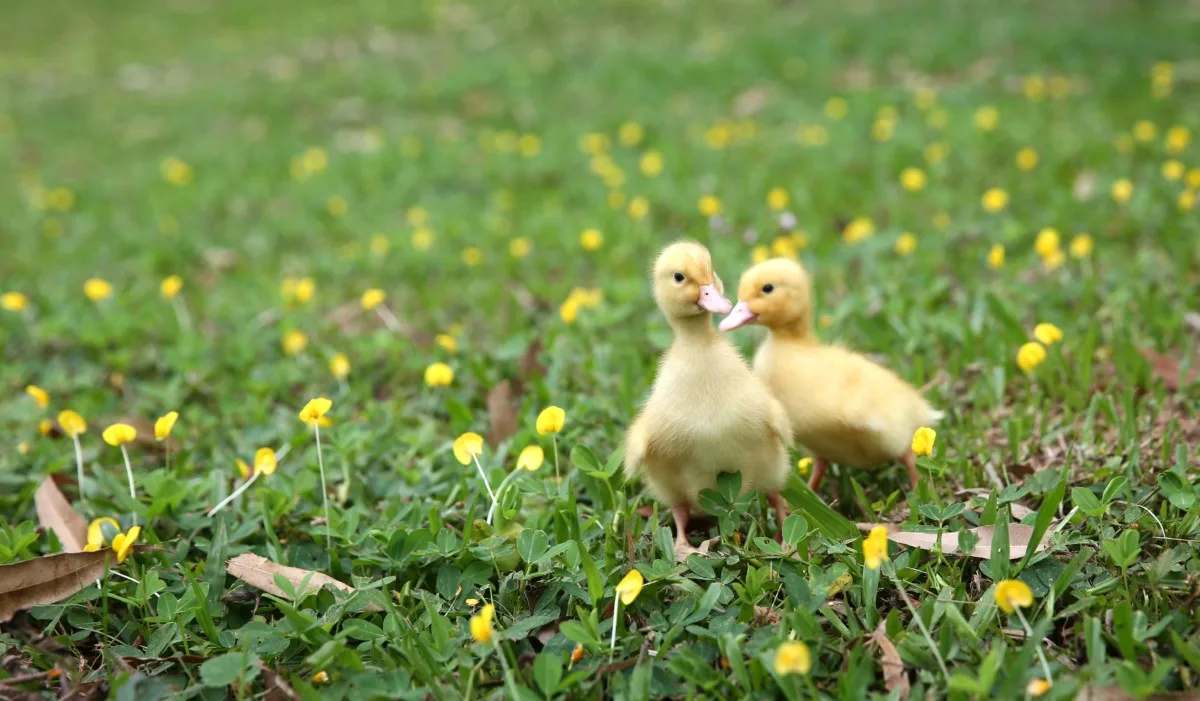
Baby ducks are even cuter than baby chicks, you have to agree with me on this point. Then, the messiness begins to happen. If you’re well prepared for it, then there’s nothing to complain about. But, the truth of the matter is ducks love, need and must have plenty of water.
Like with children, when you give them the end of the hose in the backyard, there will be mud. Ducks love that aspect of life too. Not quite jumping in mud puddles, but bathing, drilling (or noisily sifting through the mud to find edible treats), and generally enjoying the grand old dirt.
Raising ducks can bring you a lot of joy – being happy for no reason, which brings a huge smile to your face and your heart. I adore ducks, and perhaps upon reading the related articles, you will too.
Related reading: 11 Things You Need To Know About Raising Backyard Ducks
Advantages of Raising Ducks
- Eggs – ducks lay fewer eggs than chickens, though the size and the nutritional quality are superior. Duck eggs are an absolute delicacy with more vitamins and minerals than chicken eggs, plus they will enhance your baking immeasurably.
- Meat – duck meat is an excellent source of protein, along with higher amounts of iron, which is essential for our healthy blood. Ducks are docile and easy to slaughter at home.
- Fat – where would a cook be in the kitchen without fat to fry their potatoes? Duck fat is good for the heart, as it helps to reduce high blood cholesterol.
- Weed eaters – ducks are champion gardeners. As they roam, they fertilize the soil with their manure; at the same time, they’re always on the lookout for bugs and grubs. Very compatible poultry choice for the organic gardener.
- Companionship – ducks will raise your spirits as they waddle across the yard. Give them breakfast greens, and they will return the praise in the form of incredible eggs. By the way, they will readily waddle in the snow, too, for some winter fun together.
- Hatch eggs and sell ducklings – if your goal is to have an income from your homestead, hatching eggs and selling young birds will never go out of fashion.
That’s a lot of advantages! Though ducks aren’t perfect in every situation. You’ll need plenty of space that can get wet on a continuous basis if you want to keep them healthy and happy.
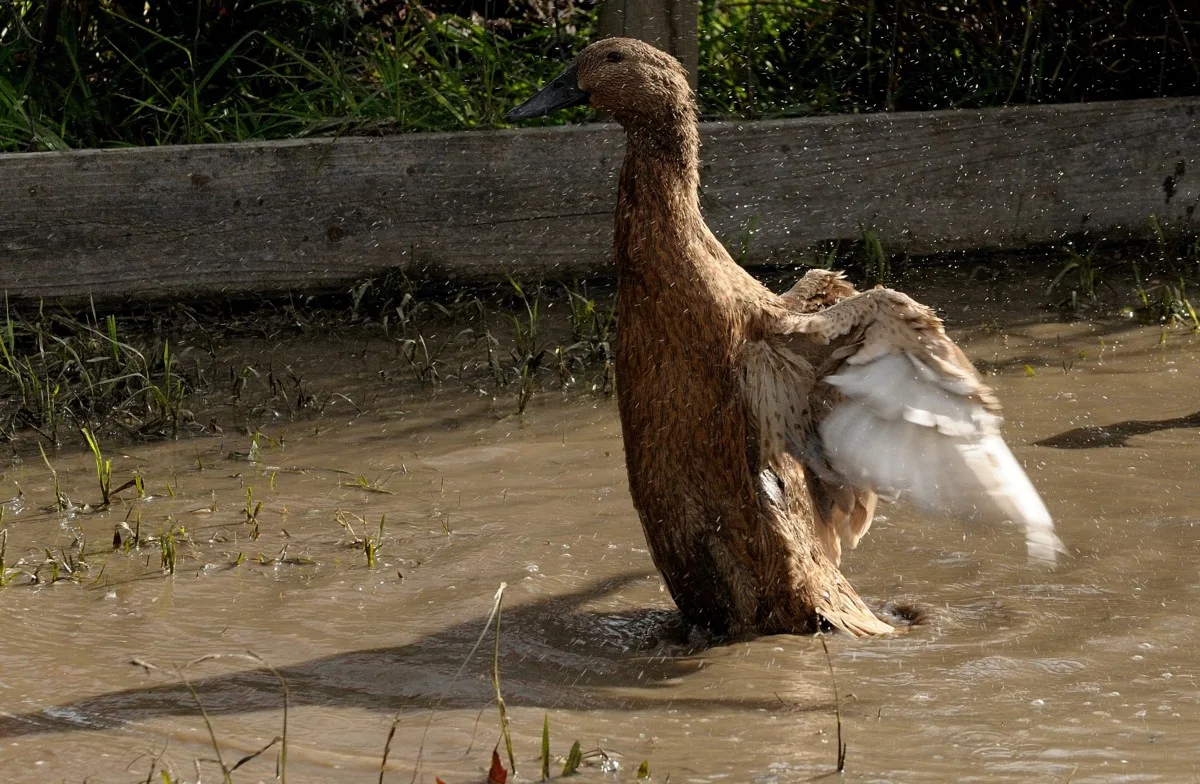
Disadvantages of Raising Ducks
- Eggs – you may see the number of eggs as a disadvantage if you are expecting them every day. Also, ducks become mature egg layers at 4-7 months, so if you are starting from chicks, it will take quite some time to receive your first gift. Ducks lay eggs wherever they feel like it – if you like egg hunts, this could be a good thing.
- Noise and mess – not all ducks are noisy, it depends on the breed, but messy, yes they are!
- Feed requirements – ducks eat more than chickens and way more than quail. If you have a large garden, chances are you may provide enough on-site; if not, you’ll have to purchase food for them, which can increase your raising costs.
The larger your homestead, farm or backyard, the better off you and your animals will always be.
Related reading: 17 Reasons to Raise Ducks Instead of Chickens
3. Quail
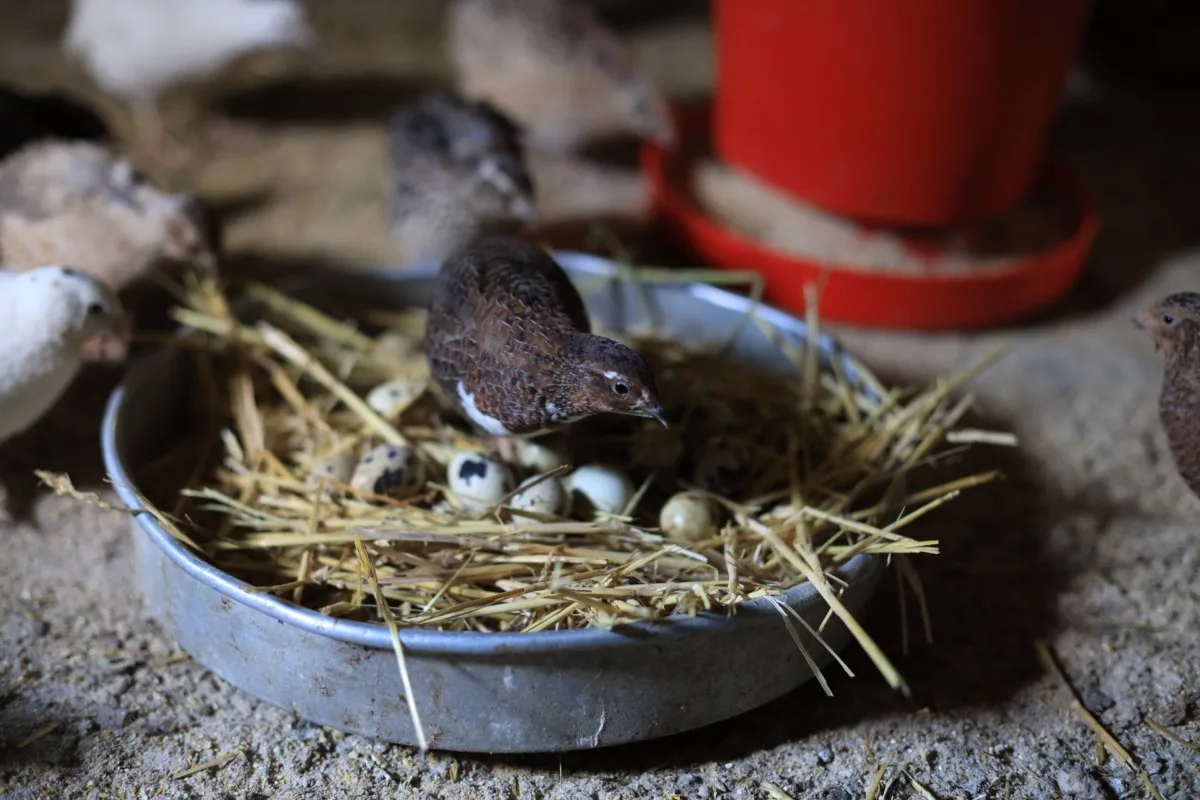
If you don’t have a lot of space yet, to dedicate to raising animals, investing in a bevy of quail may be the best thing for you.
Quail are quaintly small, they can be raised in cages, the birds are cost-effective to keep (meaning that they don’t eat a lot), and they are quiet, hardy and disease-resistant. Sounds like a dream bird!
This article explains it all: 11 Reasons to Raise Quail Instead of Ducks or Chickens + How to Get Started
Advantages of Raising Quail
- Eggs – quail quickly begin to lay eggs in as little as 6-8 weeks. The eggs, while being small in size, really pack a punch. Quail eggs contain generous amounts of vitamins B1 and B12, vitamin A and iron. Nutrition aside, they can be sold for a pretty penny to restaurants – a great way to make an extra income from home.
- Meat – poultry, in general, is easy enough to slaughter at home. Quail is the easiest of all. It’s been said that quail meat can boost your immune system, aid your vision and solve respiratory and digestive diseases – if that’s true, it must be good for you.
- Ease of care – small, tidy, quiet, family-friendly – all that a quail is and so much more.
- Space requirements – from rabbit cages to quail tractors, you’ll easily find ample space for them in your yard.
- Noiseless – quail are quite quiet and can be raised easily in your backyard. Since they are considered game birds, a town’s rules and restrictions that might prevent you from owning ducks or chickens may not apply to quail.
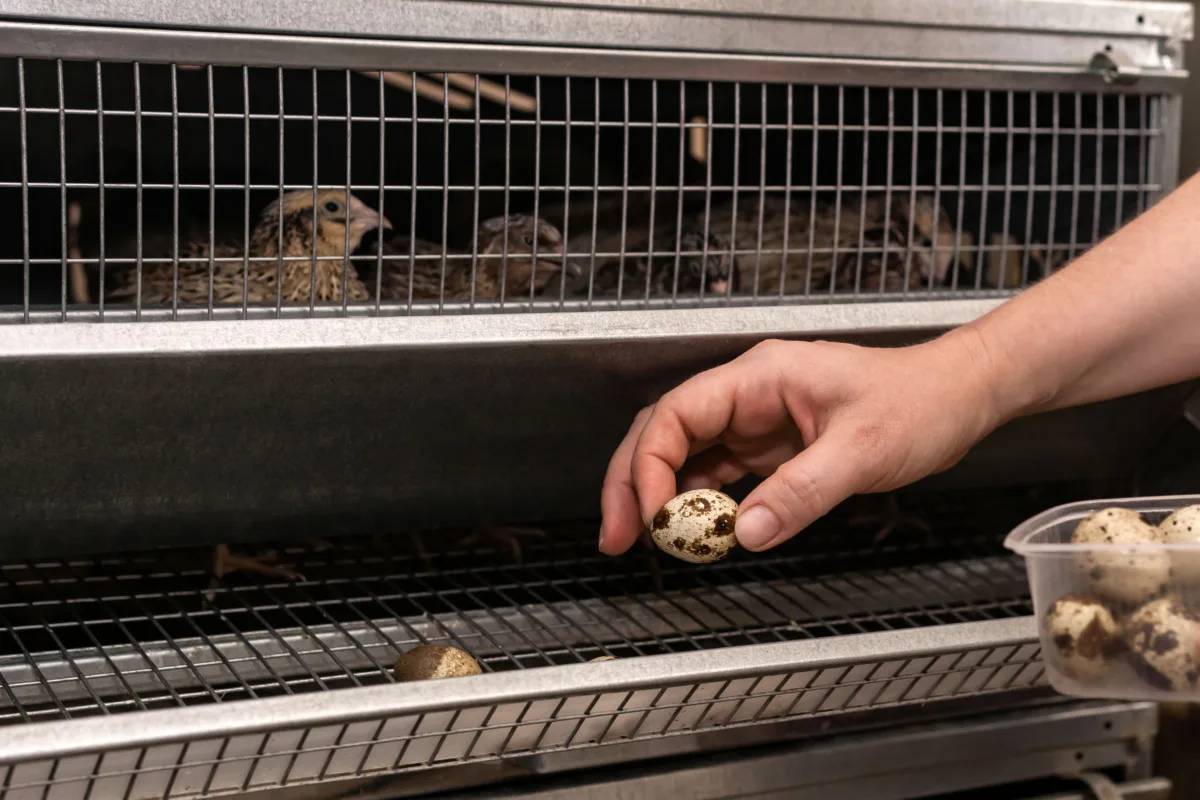
Disadvantages of Raising Quail
- Small size – if you’re interested in harvesting quail for meat, you’ll need to slaughter a few at a time. This means you have to raise larger numbers of birds to meet your family’s dietary requirements.
- Protection – due to their prey status and small size, you’ll need to protect your small flock day and night.
When all is said and done, you probably wouldn’t want to raise quail as your only source of meat. At the same time, you wouldn’t want to do this for any animal on the list.
Self-sufficiency is about diversity, as much as it is making sure your daily needs are met.
4. Geese
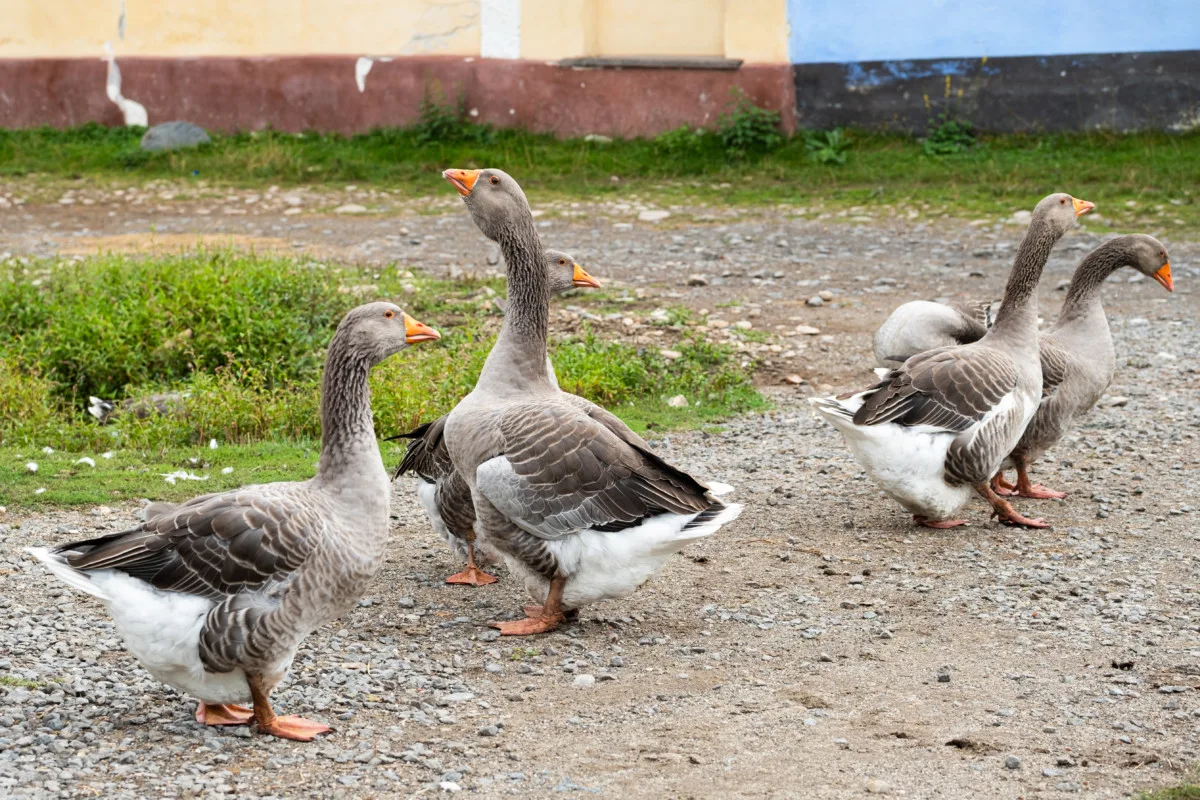
Going out on a limb here, knowing that not everyone has had a positive experience with geese. We ourselves have been chased, harassed and hissed at by the neighbor’s two geese as we were passing by on the road. One day in winter, the male slipped on the ice, became embarrassed and sauntered away, honking at his own demise. From that time on, he barely dared come out onto the road again.
And yet, there is still part of me that could imagine raising a flock of our own. Provided they have plenty of space, not quite so near the house, and definitely further from the gate.
We do like to have guests come over without fear!
Advantages of Raising Geese
- Eggs – goose eggs are large in size, yet fewer in number, containing high amounts of iron and potassium. Not surprisingly, creative hands can utilize them in handicrafts.
- Meat – goose meat has higher levels of iron than beef, pork or chicken. It’s also a significant source of B vitamins, zinc, selenium and copper.
- Manure – goose poop is a nutrient-rich fertilizer.
- Protection – as guard animals, they will alert you to any danger or stranger on your property. Learn from Antique Romans, who were protecting their towns and forts with vigilant geese.
- Natural lawn mowers and excellent foragers – geese love green grass and weeds. If you have a large yard to let them roam, this can dramatically reduce your feeding costs.
- Self-care – geese don’t need a lot of fussing over, and for the most part, they take care of themselves. Give them plenty of space and food, and they’re good for grazing.
- Long life – geese can live up to 30 years, bringing a unique companionship to your life, should you choose to accept it.
Depending on the nature of a particular goose, it can be raised as a sort of tame pet or guardian of your farm, if you will.
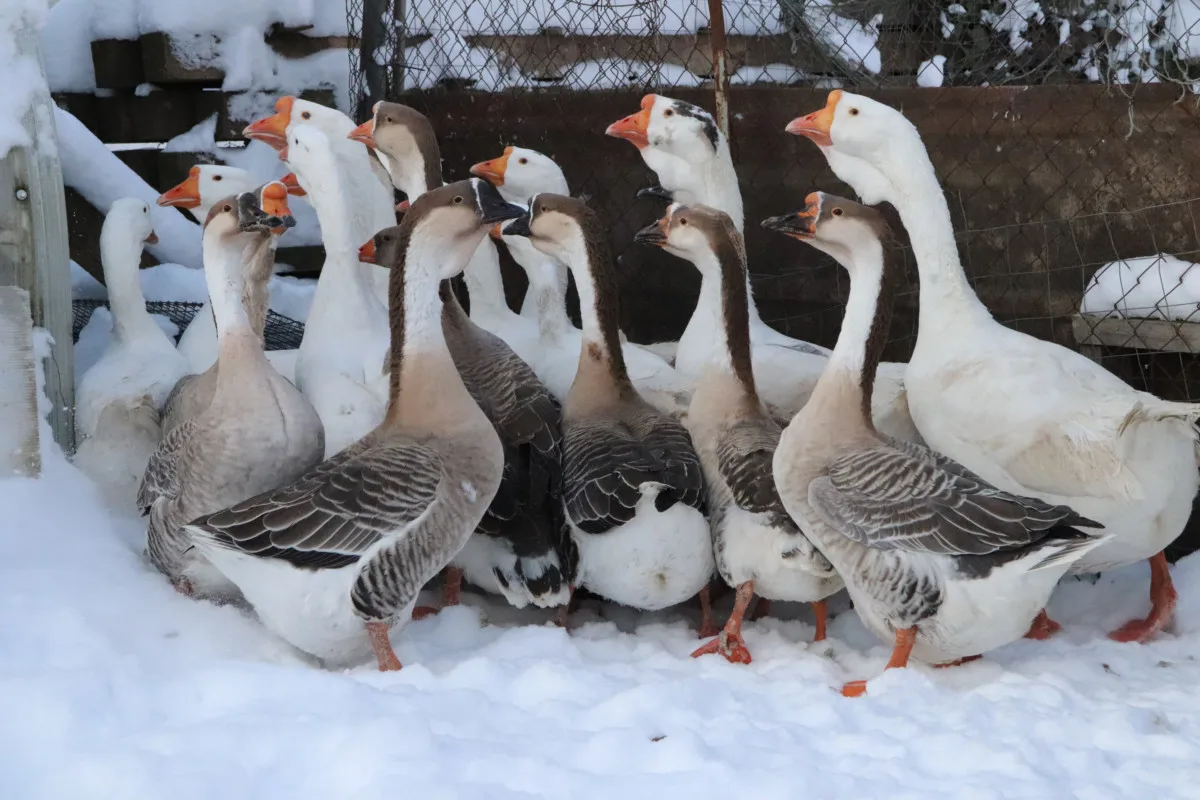
Disadvantages of Raising Geese
- Noisy – the sounds that geese make can be disagreeable to some. On the flip side, this noise can be advantageous when their services are that of a guard “dog.”
- Aggressive behavior – while most geese are good-natured, there will always be a rogue one or two. Eliminate those from your flock as soon as possible, just as you would get rid of a bad rooster.
- Hearty appetite – grass alone won’t keep your geese satisfied, so you’ll need to supplement their diet with more of what they need.
- Space and confinement – geese need to roam and generally refuse to be confined. If you have the right amount of land to support their habits, this is less of a concern.
- Social creatures – you can’t raise just one goose, nor should you try to raise one chicken, duck, goat or cow. Some creatures need the companionship of each other – a reminder to be aware of their emotional needs too.
Always be sure to choose a breed of goose right for your land and current situation.
5. Rabbits
If you are looking for a business that replicates rapidly, you might want to think about how rabbits do it. Short gestational period of 25-28 days, with the ability to produce several litters a year, non-demanding, cute and furry.
Plus, rabbits are permitted in most locations due to their popularity and pet status. For this reason, they make the list of self-sufficient animals. Rabbits are cost-effective to raise, quiet, very quiet, love dandelions and are fun to be around. Kids can learn a thing or two from raising them. If you live in the states, check out your local 4-H, which can help your kiddos get started raising rabbits.
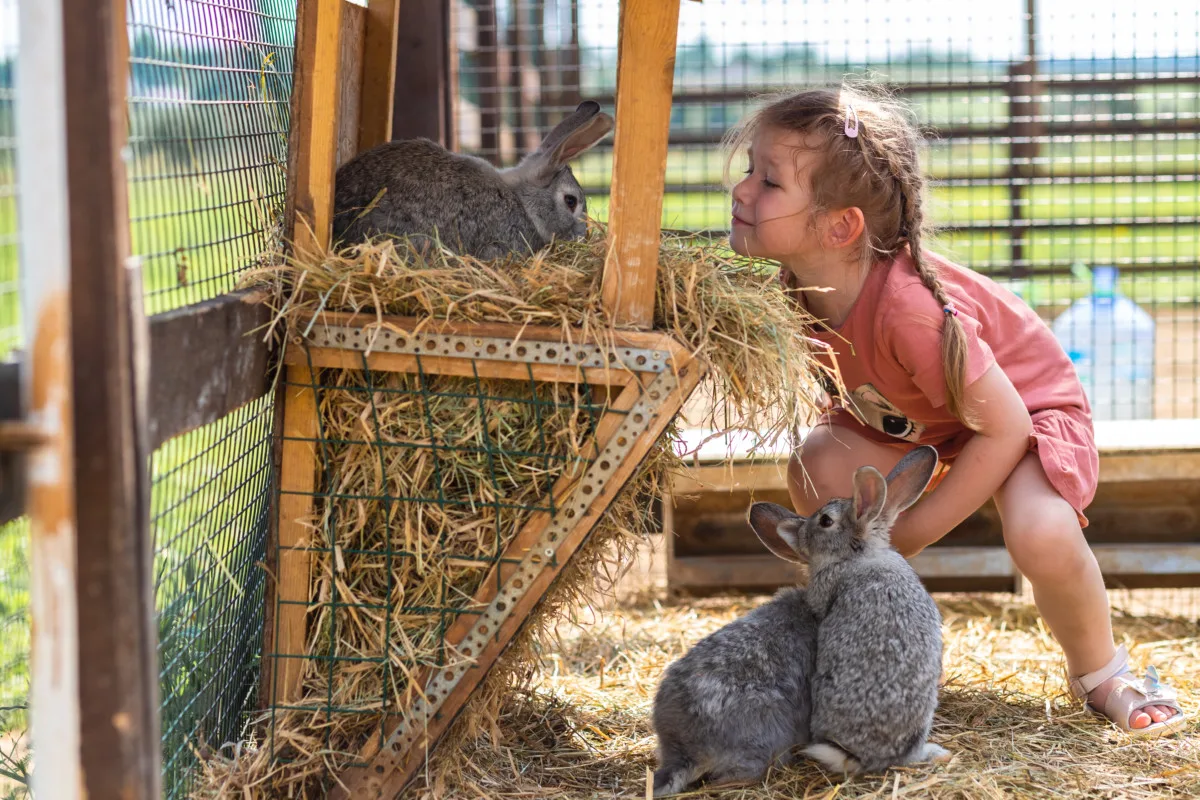
All around, raising rabbits is a win-win situation.
Related reading: 10 Reasons Everyone Should Raise Rabbits
Advantages of Raising Rabbits
- Meat – rabbit meat is perhaps an acquired taste, though it’s even easier to like when you know how easy it is to raise. It’s said that one doe’s litters can provide eighty pounds of meat per year, depending on the breed, of course.
- Fur and/or skins, as well as bones – a byproduct of raising rabbits can be their fur, which is gently combed or cut from the animal, as is the case with raising Angora rabbits. Entire rabbit skins are also valuable when creating winter vests, hats and mittens. Rabbit skin and bones boiled for several hours into a thick creamy substance makes for excellent strong glue, favored by both furniture carpenters and shoemakers (look for time-tested glue recipes).
- Manure – while you don’t necessarily want a bunny in your garden, their manure is beneficial. It is rich in organic matter, which improves soil structure, drainage and moisture retention.
- Breeding stock for sale – rabbits have their ways of repopulating throughout the year, leaving you with plenty of stock for sale.
- Space-efficient – rabbit cages can be reused for multiple years, take up little space and can be sold once you are done with the rabbit raising phase of your life.
- Lots of breeds to choose from – from meat breeds to dual-purpose breeds, you get to choose colors and sizes galore. New Zealand whites, Californians, Angoras, Giants, Satins and French rabbits.
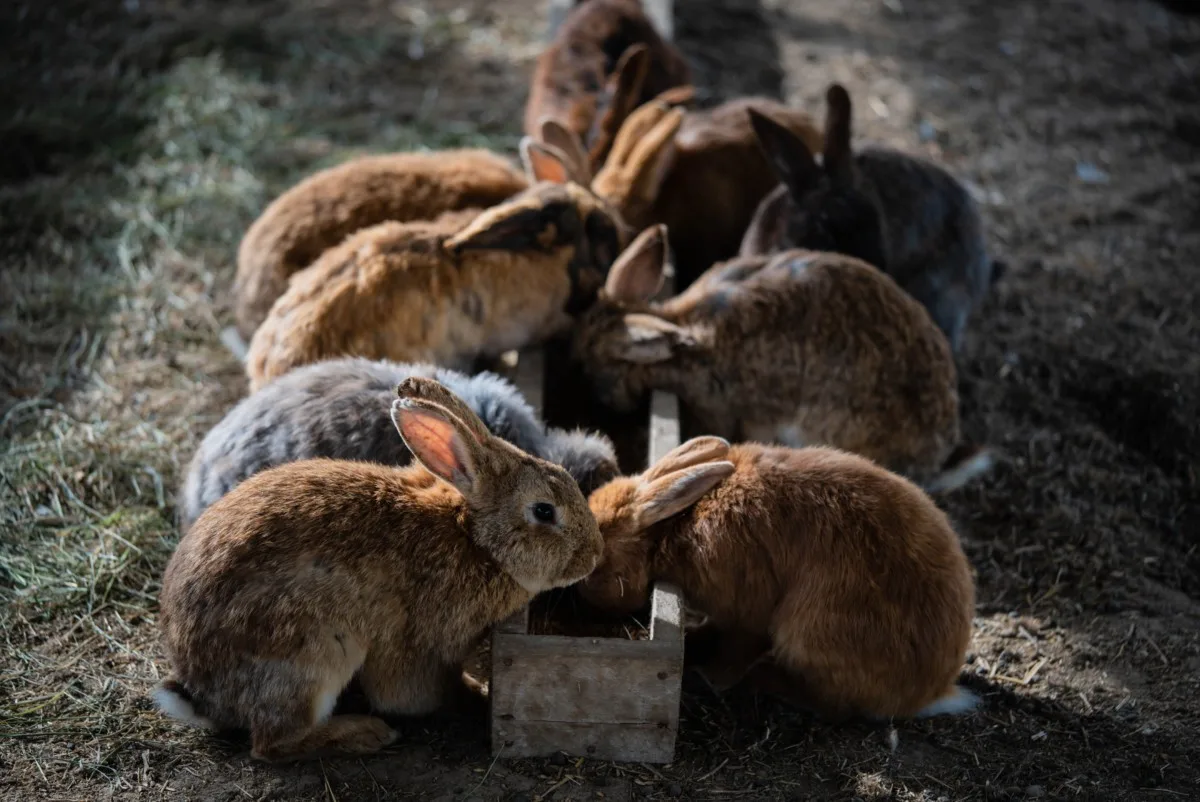
Another advantage is they will consume most of your garden scraps. Just be sure to save some for the compost pile.
Disadvantages of Raising Rabbits
- Protection – rabbits need protection not only from wildlife but perhaps from your own dog too. They need a strong, sturdy shelter to take cover in.
- Time-consuming – rabbit cages need to be cleaned out often, not exactly the most low-maintenance animal.
- Not everyone’s first choice of meat – unless you’re familiar with the taste and texture, there may be some adjustment to eating. However, in the case of eating more rabbit, we should all start to become more conscious about where our food comes from.
Rabbits are a great choice when it comes to urban homesteading. Even for larger farms, it is wise to diversify their array of animals when it comes to self-sufficient living.
6. Goats
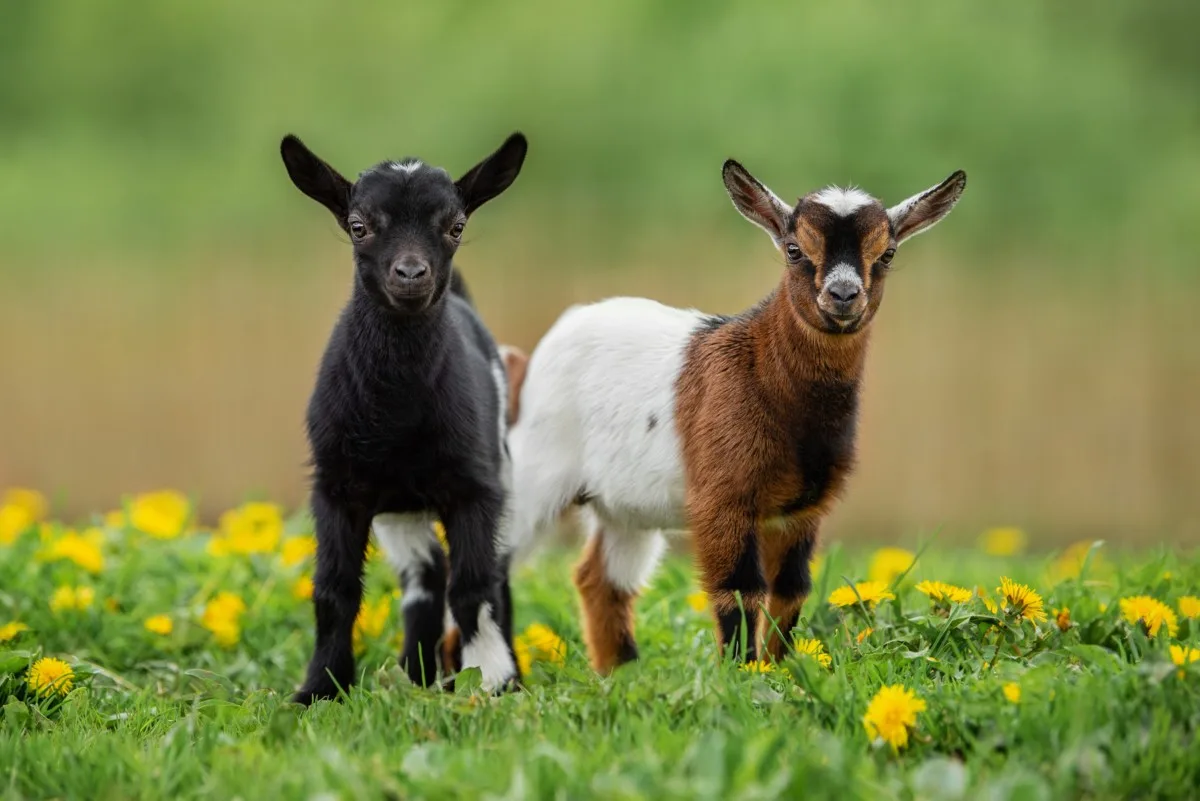
If you are seeking an animal that has it all – meat, milk and fiber – look no further than raising goats. You’ll be met head-on with a creature that bleats till its heart is content. There’s no mistaking the noise they make, so be prepared for some early mornings with goats on the farm.
Before buying a few goats (you can’t raise just one), you need to know that they don’t eat everything. In fact, they can be downright picky. They prefer buds to grass and weeds, and they feed almost constantly.
Goats can be tricky to handle, and each one will have its own personality, so you never know what you’re going to get.
Perhaps that’s part of the fun and excitement of raising goats.
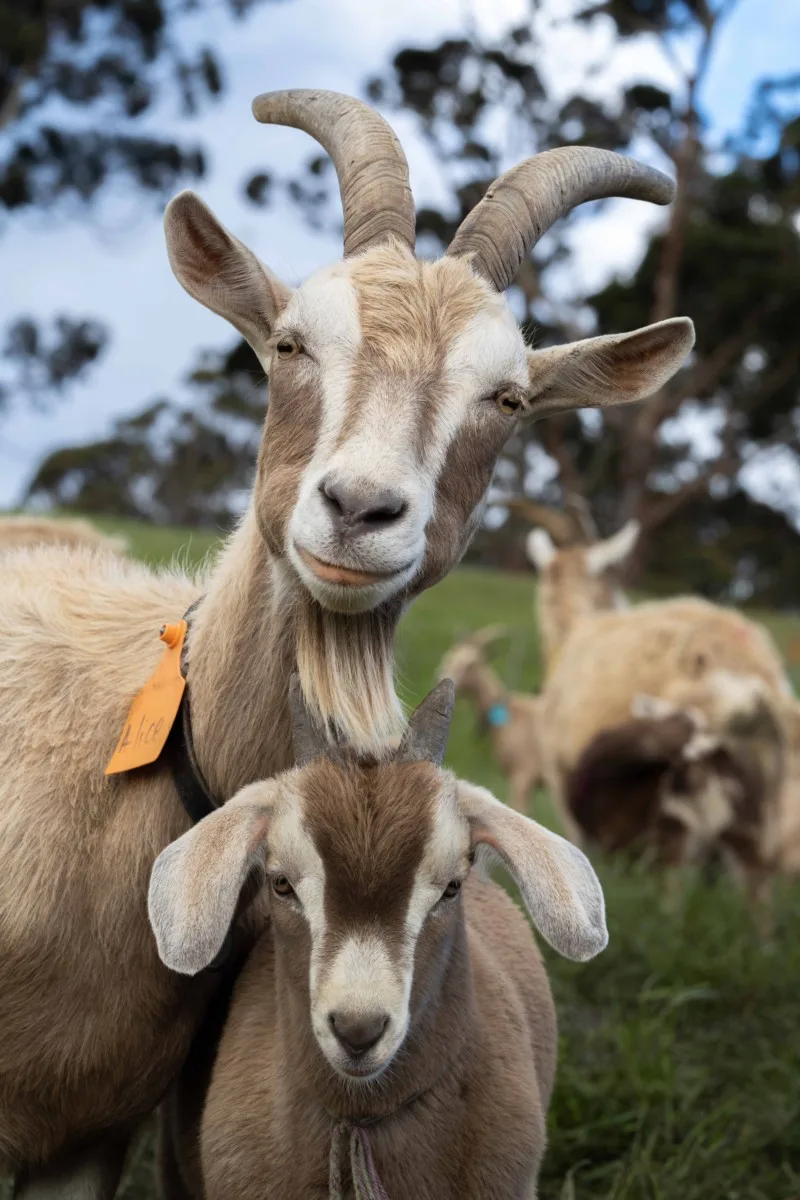
Advantages of Raising Goats
- Milk – it’s proven that goat milk is easier to digest than cow milk; the proof is in the smaller fat globules and in the medium-chain fatty acids. It also has much to do with the milk proteins; goat milk contains strictly A2 casein. Either way, it is fabulous for making butter, yogurt and cheese.
- Meat – goat meat is low in fat and cholesterol, yet high in protein, iron, calcium and potassium. Here’s why you should be eating more of it.
- Weed eater and brush manager – goats are known to eat everything, or about that much. In my experience, they can be quite picky. One thing they never seem to have enough of is branches.
- Fiber/Fleece – fleeces for spinning, knitting and weaving can flourish on your farm, depending on the breed of goat you choose to raise: Angora, Pygora, Nigora, or Cashmere.
- Hides/Goat skin – goat skin drums have such a pleasing sound – which may even pave the way to becoming a drum maker.
- Offspring for sale – goat kids are cute, there’s no doubt about that. Making a small income after weaning the kids from their mothers may work out great, especially if they are nannies.
Disadvantages of Raising Goats
- Noise – again, it depends on the individual goat, but there may be a concern for the level of noise they make early in the morning. Great if you need an alarm clock to remind you that they need to be fed.
- Amount of care – raising goats takes far more time than tending to your poultry. But, the bigger the animal, the greater the reward. As long as you have enough space – and food – to give them, they will be happy. Never have only one.
- Escape artists – Goats will find a way to climb, push and wiggle their way into strange circumstances and will need to be rescued from time to time. A secure pen/barn is the only way to play it safe.
Raising goats probably isn’t for the faint of heart, though it is an excellent way to get acquainted with bigger-bodied animals. If you are thinking of owning a cow in the future, a goat is an excellent way to start.
7. Pigs
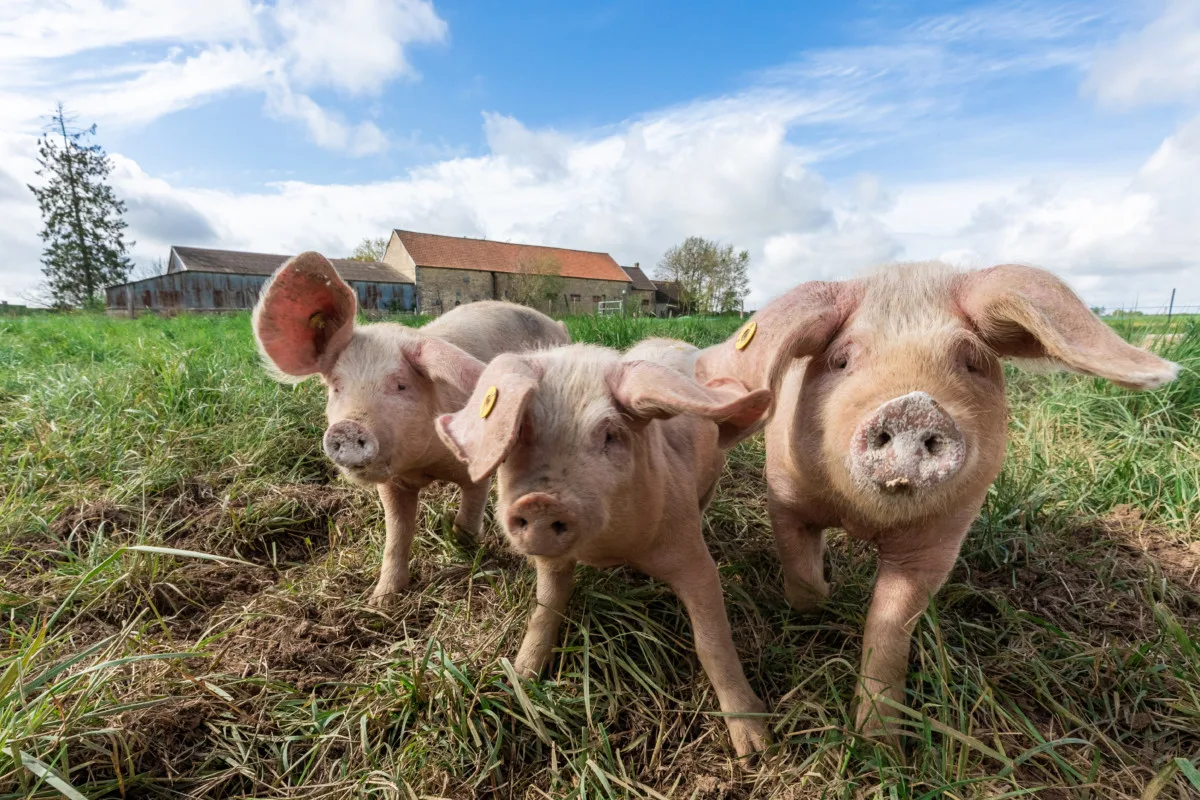
My husband and I once brought pigs home in the front baskets of our bicycles. One in each basket, and my, was it an ordeal! The squealing, the squirming and the trying to escape – the 6-kilometer ride couldn’t be over soon enough.
They turned out to be excellent Mangalica pigs, though. One day when they escaped their pen, they ran down to the road, trotted quickly back and stepped cautiously into our house (open door policy in summer) to find us. Obligingly, they went back to their pen, ecstatic about their little adventure.
If you’re going to raise pigs, don’t let yourself fall for one second into the mindset of keeping them as pets. This makes perfect sense when it comes time to slaughter them for bacon, bones and pork roasts.
Pigs are highly intelligent, wonderful creatures that will surely bring wonderful moments to your homestead.
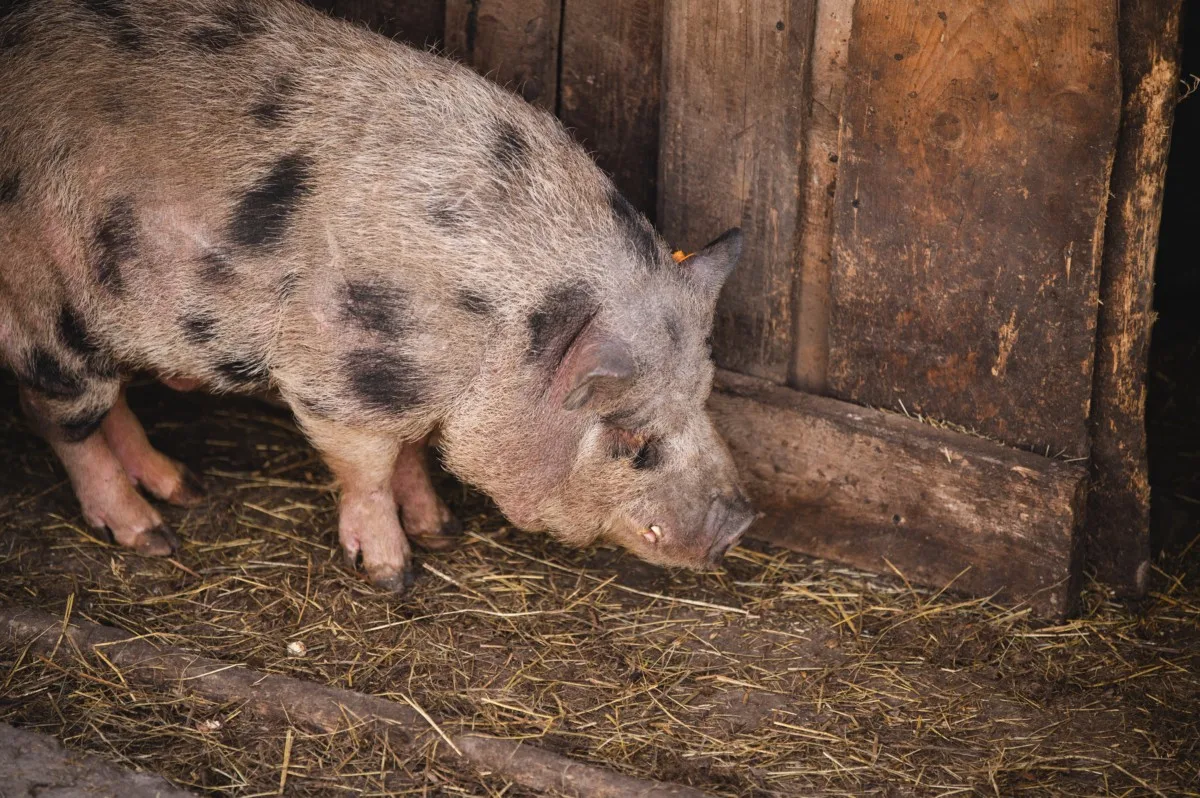
Advantages of Raising Pigs
- Meat for your family – the absolute number one reason for raising pigs is for their meat. Homegrown meat tastes amazing, provided you take great care of your animals. Because you have so much to harvest at once, you’ll need more than one way to preserve it: a blend of freezing, canning and curing should do the trick.
- Bacon and lard – let no part of the pig go to waste, lard is always there for when you don’t have dairy animals on the homestead yet. Bacon and eggs? Yes, please.
- Pork for sale – if your pigs grow bigger than your family needs, you can sell the excess for income. Or start a pork share at the beginning of the raising season.
- Selling piglets – sows often have litters of up to 10 piglets. If you don’t have space, sell them.
- Humor – pigs are wise beyond the credit we give them. Get to know them, and you’ll find out that even though they are feisty, they’re also friendly and curious, sure to make you smile.
Disadvantages of Raising Pigs
- Smell – pig manure. Enough said. Wear steel-toed rubber boots.
- Noise – oinking is ultra-cute when they are little, a lot louder the bigger they get, especially when they have missed a meal.
- Cost of feed – to eat like a pig is to consume 6-8 pounds of food per day. Sure they will eat garden scraps, though grains are what contribute to the bulk of their weight. If you grow the grains yourself, great. If not, be ready to invest in feed.
- Cleaning time – pigs are both noisy and nosy and have a tendency to sample things with their mouths. Rocks, mice, eggs, whatever gets in their way. Start off your relationship right by giving them plenty of neck rubs and belly massages, and you’ll be great friends.
When all is said and done, you’re either a pig person or not. You’ve gotta love their energetic ways and ability to dig with fervor. You might put them in a cage, but they’ll never stop living out their piggy ways.
8. Cows
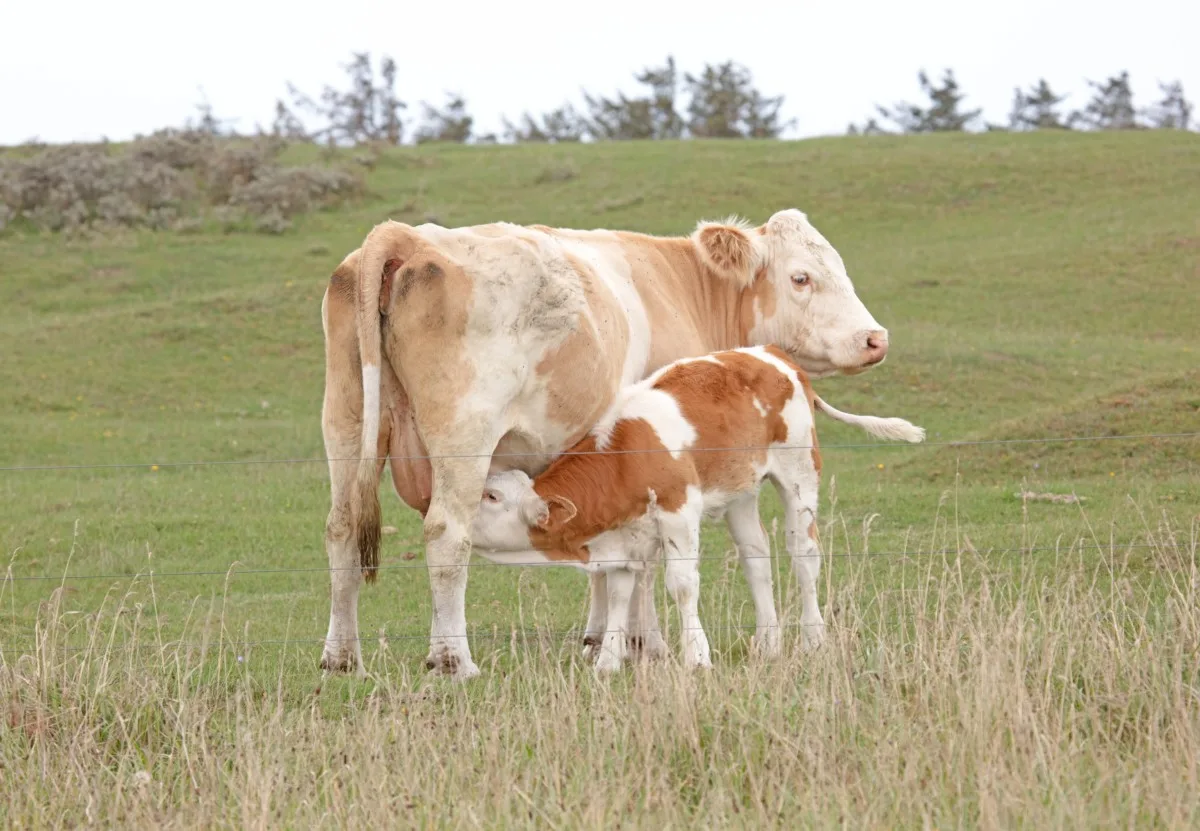
It’s long been a dream of ours to own a Guernsey cow. Their milk contains 33% more vitamin D and 15% more calcium than regular milk. It also contains high levels of beta carotene, which gives the milk a golden color, as it improves vision, heart, lung and cognitive function.
Guernsey cows also happen to be more uniquely A2 (a protein in cow’s milk), for those with issues digesting lactose.
If you’re fortunate enough to have sufficient land for raising these magnificent creatures, your ladies will provide you with plenty of milk, meat and income. If you’ve got land but not enough for a full-sized cow, consider mini cattle.
Advantages of Raising Cows
- Milk – if you go through a lot of milk, one way to eliminate all that unnecessary plastic waste is to head out to the barn and milk your own cow every day. 2-5 gallons a day can be expected from each milking cow, leaving you with plenty of nutritious material for making butter, yogurt, cheese, even ice cream.
- Meat – if a pig slaughter leaves you feeling overwhelmed, what about harvesting the meat from a young calf or a full-grown cow? It’s plenty. One cow can feed your family for an entire year. Combine that with your garden veggies, and a self-sufficient life is well underway.
- Selling cultured butter, yogurt, cheese and other dairy products – again, with so much milk and cream, you’ll have excess. Find creative ways to sell it, and keep the cycle of giving and receiving in motion.
- Sale of calves – At this level of self-sufficiency, you’re going to have to gather some veterinary skills if you don’t want to leave it all to chance. Still, selling calves will always bring you a little bit of money for your efforts.
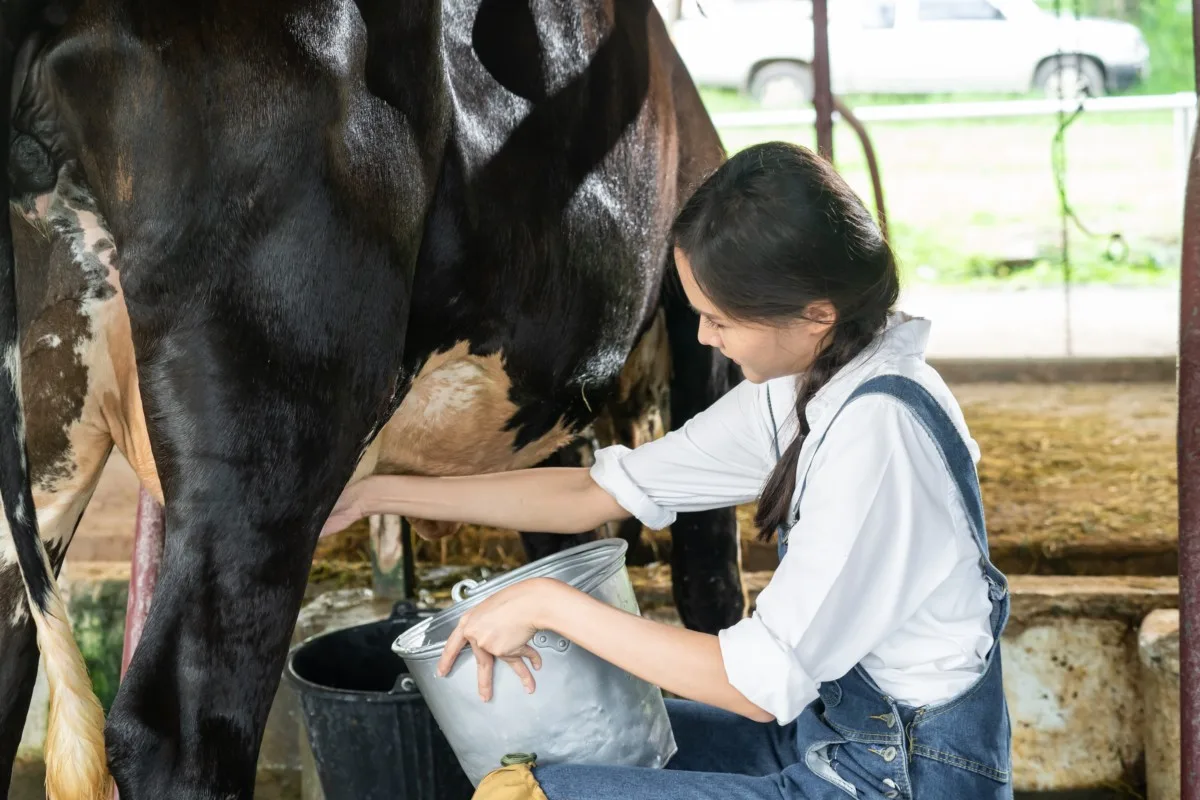
Disadvantages of Raising Cows
- Large investment – cows have an upfront cost, a feeding cost and a slaughtering cost. It must be worth your time to be enjoyable.
- Land requirements – it depends on where you live and what the land has to provide; on average, some estimates state that you need 1.8 acres per cow.
- Feed requirements – if you aren’t grazing, you’ll still need a source of good quality hay and supplements to their diet. Costly now, one can only imagine that costs will rise in the coming years.
- Breeding problems – we won’t get into it here, though we’d encourage you to read some articles and good books before getting in too deep.
- More meat and milk than your family needs – perhaps this is a good problem to have, yet, too much of a good thing is still too much. If you have no way to offload your excess, it will become waste – or feed for your pigs.
If you are up for the challenge of raising a larger animal, cows are often docile and ready to work with you. In exchange, you’ll get all the raw milk you could ever imagine.
Related reading: 12 Things to Know About Raising Cows from Hello Homestead.
9. Bees
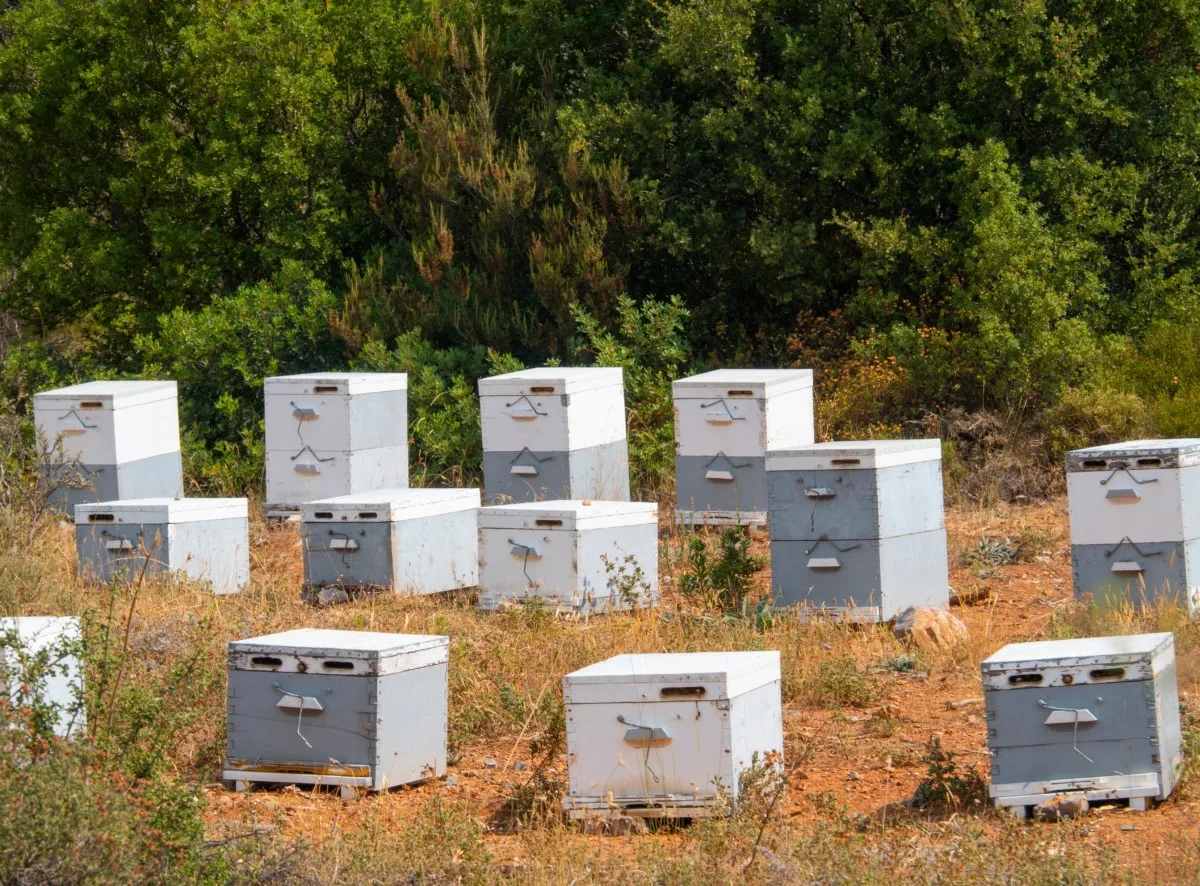
There are numerous plants you can cultivate in your own garden to attract bees and other pollinators, and that’s all well and good. However, if you really want to help bees thrive, it may be worth looking into becoming a beekeeper.
If you’re thinking about introducing honey bees to your repertoire of livestock rearing, gather all the information and hands-on experience you can before getting started. Even in the smallest space, you can still cater to the bees, so this one is an excellent choice for urban homesteaders too. Let’s go over the good and the bad, so you’re better informed about whether keeping bees is right for you.

Advantages of Keeping Bees
- Honey – with an extended shelf life, you can keep honey for several years, not that it would ever take you so long to consume it. You can use it raw, in canning and preserving, and as a remedy, should you ever get stung by a bee. Honey is a healthy way to replace processed sugar in your diet.
- Beeswax, pollen, propolis, royal jelly – keeping bees is all about an exchange of energy. Take care of them, and they will reward you with many valuable and nutritious health products. You can even learn to make your own beeswax candles or use the wax in healing salves.
- Pollination – if you are an avid gardener, you’ll love knowing that your bees are increasing the production of your garden and orchard. They’ll also pollinate your neighbor’s crops too.
Disadvantages of Keeping Bees
- Allergies – if you or anyone in your family is allergic to bees, better leave the bees to other carers for obvious reasons.
- Learning curve – learning about how to take care of bees may be easier for some and more difficult for others. It is advisable to take classes and participate in cleaning and harvesting from hives of other beekeepers before starting out on your own.
- High startup costs – just because they’re small doesn’t mean they are cheap.
Whether you live in the city or out in the country, keeping bees may be right for you.
10. Fish

With a smallish pond, or an aquaponic system, you too can be the proud keeper of catfish, tilapia, carp, bass, perch or trout. Provided you like to eat fish, it’s a superb way of making self-sufficiency work on your homestead.
If you live in a land-locked area, it may be the only way to get fresh fish. As always, if it’s worth it, you’ll find a way to make it work.
Advantages of Keeping Fish
- Source of vitamins and minerals – fish meat is a rich protein source, containing many nutrients such as omega-3 fatty acids, calcium, phosphorus, vitamin B12 and selenium.
- Selling fish stock and spawn – at some point in your fish-raising adventure, you’ll have more than you need. In this case, you can sell off your abundance in the form of the live fish themselves or their young spawn. Other homesteaders need help starting out too.
- Self-sufficiency – a well-working aquaponic system can provide fresh fish throughout the entire year that is free of chemicals, fertilizers and herbicides. Can you imagine harvesting hundreds of pounds of fish a year? Yes, you can.
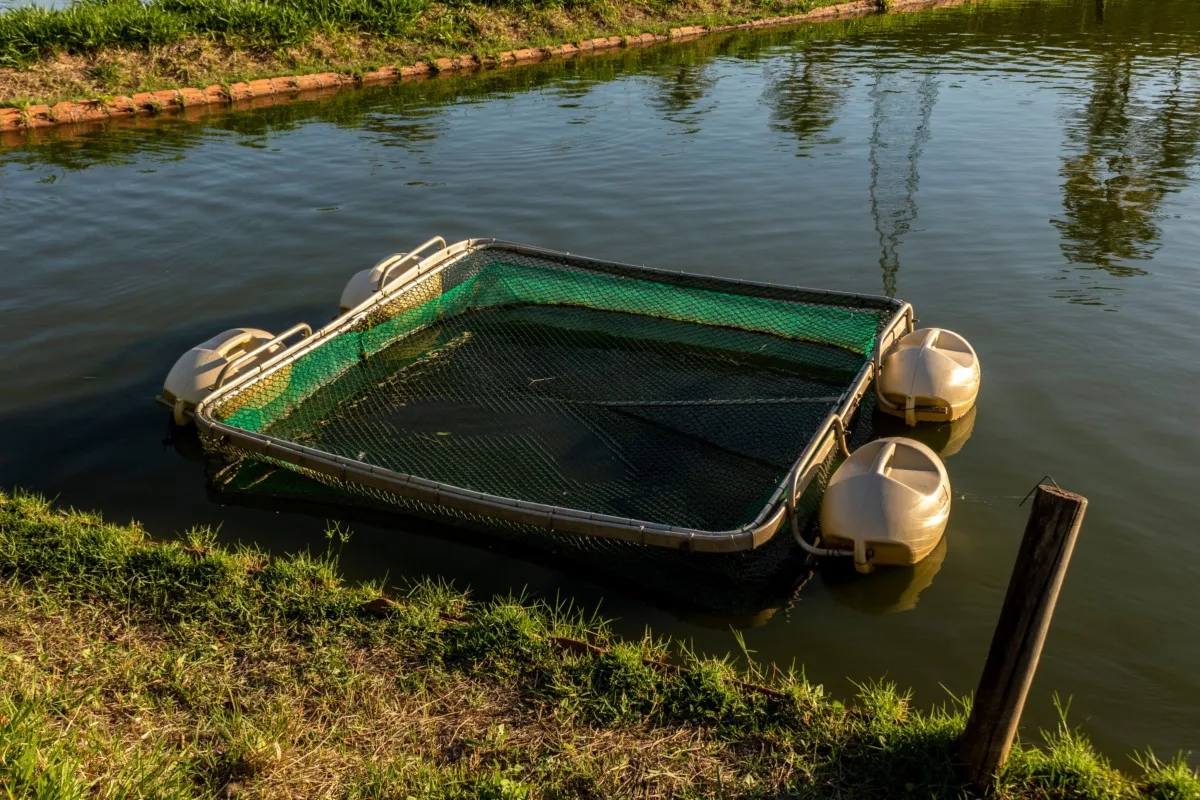
Disadvantages of Keeping Fish
- Time – it takes several months for a fish to reach maturity, time depends on the species of fish. Once they do reach harvestable size, you have hundreds to process at once.
- Cost of setting up an aquaponic system – starting at a few thousand dollars, systems can be purchased online and installed by you. You can also go the DIY route: How to Grow with Aquaponics in 5 Simple Steps to save a little bit of money on the upfront costs.
- Fresh, clean water – fish thrive in clean water, and tanks will need to be cleaned often. If you have a regular maintenance schedule, you’ll all get through it easier.
In order to raise fish, as with any animal on this list, it helps to have a passion either for it or eating it or both.
While fish probably wouldn’t become your sole source of protein, it’s always the aim of self-sufficiency to offer diversity.
As tempting as it is to learn several new things at once, it is wise to choose one animal first as you learn their ways. In turn, you will find out a lot about yourself.
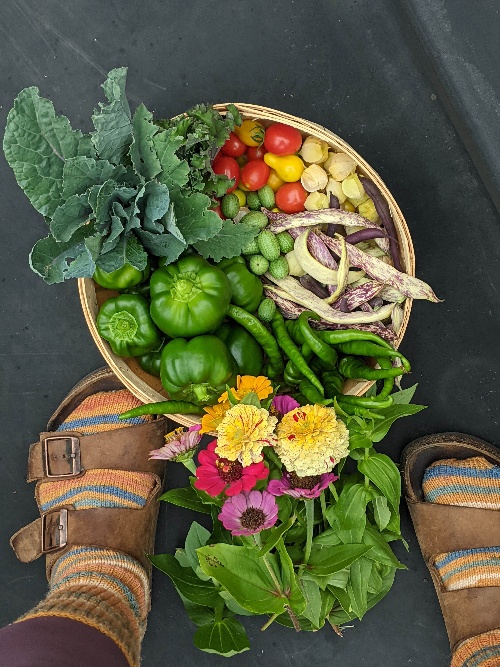
Get the famous Rural Sprout newsletter delivered to your inbox.
Including Sunday musings from our editor, Tracey, as well as “What’s Up Wednesday” our roundup of what’s in season and new article updates and alerts.

